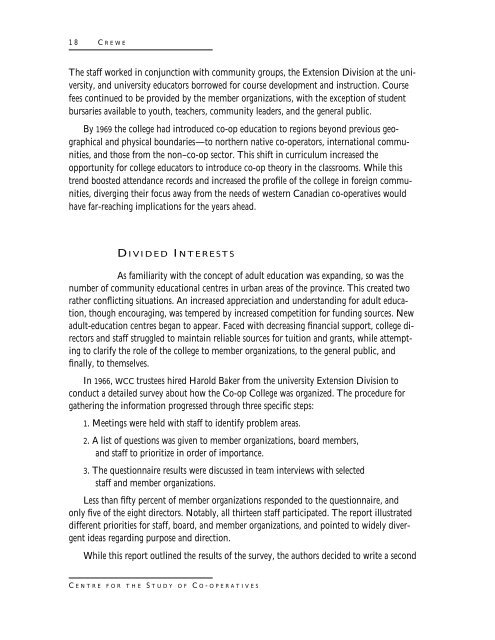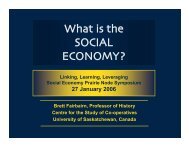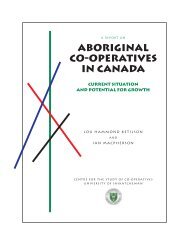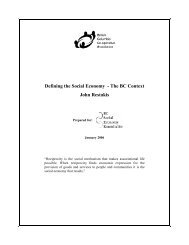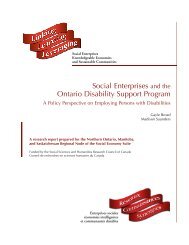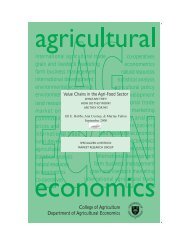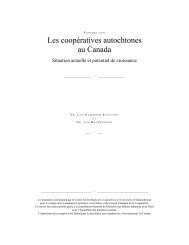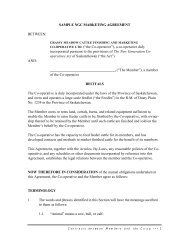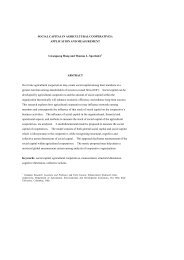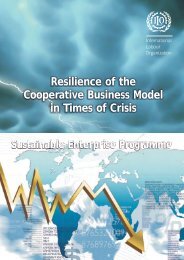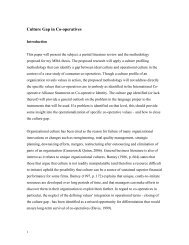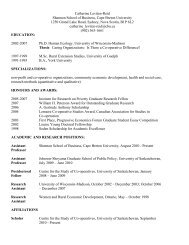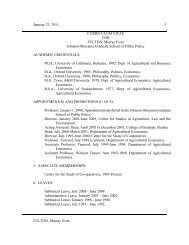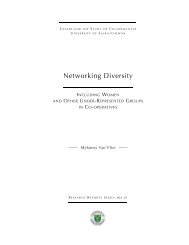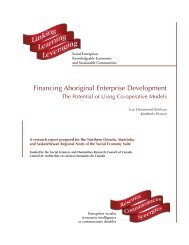Co-op College History - Centre for the Study of Co-operatives
Co-op College History - Centre for the Study of Co-operatives
Co-op College History - Centre for the Study of Co-operatives
Create successful ePaper yourself
Turn your PDF publications into a flip-book with our unique Google optimized e-Paper software.
18 CREWE<br />
The staff worked in conjunction with community groups, <strong>the</strong> Extension Division at <strong>the</strong> university,<br />
and university educators borrowed <strong>for</strong> course devel<strong>op</strong>ment and instruction. <strong>Co</strong>urse<br />
fees continued to be provided by <strong>the</strong> member organizations, with <strong>the</strong> exception <strong>of</strong> student<br />
bursaries available to youth, teachers, community leaders, and <strong>the</strong> general public.<br />
By 1969 <strong>the</strong> college had introduced co-<strong>op</strong> education to regions beyond previous geographical<br />
and physical boundaries—to nor<strong>the</strong>rn native co-<strong>op</strong>erators, international communities,<br />
and those from <strong>the</strong> non–co-<strong>op</strong> sector. This shift in curriculum increased <strong>the</strong><br />
<strong>op</strong>portunity <strong>for</strong> college educators to introduce co-<strong>op</strong> <strong>the</strong>ory in <strong>the</strong> classrooms. While this<br />
trend boosted attendance records and increased <strong>the</strong> pr<strong>of</strong>ile <strong>of</strong> <strong>the</strong> college in <strong>for</strong>eign communities,<br />
diverging <strong>the</strong>ir focus away from <strong>the</strong> needs <strong>of</strong> western Canadian co-<strong>op</strong>eratives would<br />
have far-reaching implications <strong>for</strong> <strong>the</strong> years ahead.<br />
D IVIDED I NTERESTS<br />
As familiarity with <strong>the</strong> concept <strong>of</strong> adult education was expanding, so was <strong>the</strong><br />
number <strong>of</strong> community educational centres in urban areas <strong>of</strong> <strong>the</strong> province. This created two<br />
ra<strong>the</strong>r conflicting situations. An increased appreciation and understanding <strong>for</strong> adult education,<br />
though encouraging, was tempered by increased competition <strong>for</strong> funding sources. New<br />
adult-education centres began to appear. Faced with decreasing financial support, college directors<br />
and staff struggled to maintain reliable sources <strong>for</strong> tuition and grants, while attempting<br />
to clarify <strong>the</strong> role <strong>of</strong> <strong>the</strong> college to member organizations, to <strong>the</strong> general public, and<br />
finally, to <strong>the</strong>mselves.<br />
In 1966, WCC trustees hired Harold Baker from <strong>the</strong> university Extension Division to<br />
conduct a detailed survey about how <strong>the</strong> <strong>Co</strong>-<strong>op</strong> <strong>Co</strong>llege was organized. The procedure <strong>for</strong><br />
ga<strong>the</strong>ring <strong>the</strong> in<strong>for</strong>mation progressed through three specific steps:<br />
1. Meetings were held with staff to identify problem areas.<br />
2. A list <strong>of</strong> questions was given to member organizations, board members,<br />
and staff to prioritize in order <strong>of</strong> importance.<br />
3. The questionnaire results were discussed in team interviews with selected<br />
staff and member organizations.<br />
Less than fifty percent <strong>of</strong> member organizations responded to <strong>the</strong> questionnaire, and<br />
only five <strong>of</strong> <strong>the</strong> eight directors. Notably, all thirteen staff participated. The report illustrated<br />
different priorities <strong>for</strong> staff, board, and member organizations, and pointed to widely divergent<br />
ideas regarding purpose and direction.<br />
While this report outlined <strong>the</strong> results <strong>of</strong> <strong>the</strong> survey, <strong>the</strong> authors decided to write a second<br />
C ENTRE FOR THE S TUDY OF C O - OPERATIVES


